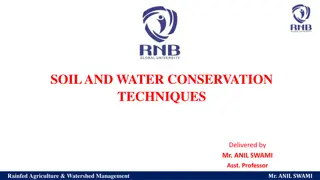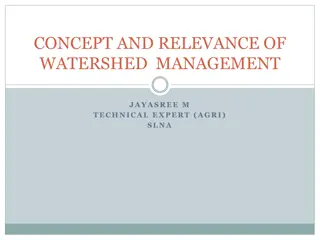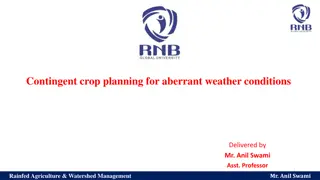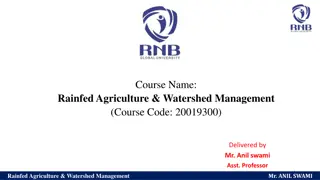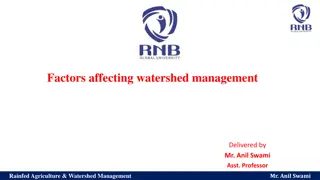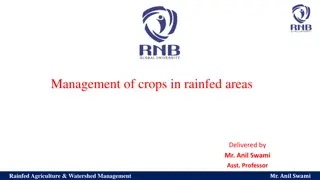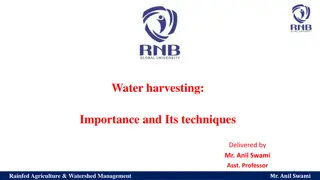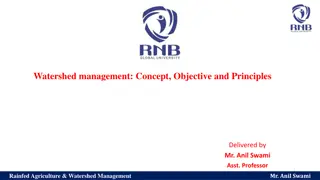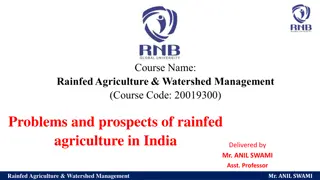Challenges in the Rice Value Chain in Guinea
Guinea faces various challenges in its rice value chain despite being a significant producer. The country's production has increased, but it still struggles to meet domestic demand, leading to substantial rice imports. Rice cultivation is vital for Guinea's socio-economic development, with over 80%
6 views • 19 slides
Soil and Water Conservation Techniques in Rainfed Agriculture by Mr. Anil Swami
Explore soil erosion and various conservation techniques discussed by Mr. Anil Swami, an Assistant Professor specializing in Rainfed Agriculture and Watershed Management. Learn about prevalent soil and climatic conditions in rainfed areas, water harvesting techniques, contingent crop planning, seaso
0 views • 66 slides
Urgency of Watershed Management for Sustainable Agriculture
Watershed management is crucial due to dwindling land availability, water scarcity projections, and the severe threat of soil erosion and land degradation. With vast regions affected by these issues, especially in rainfed areas, there is a pressing need to address resource degradation to ensure food
0 views • 50 slides
Strategies for Crop Planning in Aberrant Weather Conditions
Delve into the challenges of aberrant weather in rainfed areas, exploring soil and climatic conditions, water harvesting techniques, and contingency crop planning. Discover the impact of erratic rainfall patterns on crop growth and learn about midseason corrections to mitigate adverse effects. Explo
0 views • 24 slides
Rainfed Agriculture & Watershed Management Course Overview
This course on Rainfed Agriculture & Watershed Management, delivered by Mr. Anil Swami, covers topics such as soil and climatic conditions in rainfed areas, water harvesting techniques, contingent crop planning, seasonal rainfall analysis, and soil conservation practices. It emphasizes the significa
0 views • 22 slides
Factors Influencing Watershed Management Explained by Mr. Anil Swami
Mr. Anil Swami, an Assistant Professor specializing in Rainfed Agriculture & Watershed Management, discusses the factors affecting watershed management. These factors are categorized into watershed characteristics, climatic characteristics, land use patterns, social status, and organization. Watersh
0 views • 18 slides
Efficient Crop Management in Rainfed Areas by Mr. Anil Swami
Efficient crop management in rainfed areas is crucial for sustainable agricultural practices. Mr. Anil Swami, an Assistant Professor specializing in Rainfed Agriculture & Watershed Management, emphasizes the importance of soil and climatic conditions, water harvesting techniques, contingent crop pla
0 views • 63 slides
Water Harvesting Techniques in Rainfed Agriculture & Watershed Management
Water harvesting plays a crucial role in rainfed agriculture by collecting and storing runoff water for irrigation in arid and semi-arid regions. Mr. Anil Swami, an assistant professor, discusses the importance of water harvesting techniques, including runoff farming and rainwater harvesting. He emp
0 views • 13 slides
Watershed Management: Concepts, Objectives, and Principles Explained by Mr. Anil Swami
Watershed management involves the rational use of land, water, and vegetation resources to optimize production while minimizing risks. Mr. Anil Swami emphasizes the importance of understanding soil and climate conditions, implementing water harvesting techniques, and practicing contingent crop plann
0 views • 14 slides
Challenges and Opportunities in Rainfed Agriculture in India
Exploring the issues faced in rainfed agriculture in India, Mr. Anil Swami sheds light on the constraints such as climatic, soil, and resource limitations. He discusses the significance of water harvesting techniques, contingency crop planning, and soil conservation practices to enhance productivity
0 views • 37 slides

